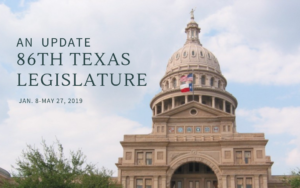The 2019 Legislative Session adjourned sine die on May 27.
 The Texas Legislature adjourned sine die on May 27. We have been watching the session closely, especially with an eye toward bills that can affect the affordability of electric and gas service. Here is a quick review of some of the bills on our watch list with their final disposition marked in RED.
The Texas Legislature adjourned sine die on May 27. We have been watching the session closely, especially with an eye toward bills that can affect the affordability of electric and gas service. Here is a quick review of some of the bills on our watch list with their final disposition marked in RED.
Gas Utility Matters
- House Bill 1767 would direct the Railroad Commission to presume the cost of employee compensation and benefits are reasonable for rate-setting purposes if those expenses are consistent with recent market compensation studies. Our analysis shows this legislation, if adopted, could lead to higher-than-necessary utility rates and potentially undermine reliability. Status: PASSED. The House on May 24 concurred with Senate amendments and the legislation went to the governor on May 26. He signed it on June 15.
- House Bill 864 and House Bill 866. These two bills are among a dozen or so filed by Rep. Rafael Anchia in response to a 2018 gas explosion that killed a 12-year-old girl in Dallas. HB 864 relates to reporting requirements for pipeline incidents. HB 866 relates to the replacement of certain gas pipelines with plastic pipes. Status: PASSED. The House and Senate adopted both bills. HB 866 went to the governor on May 22 and he signed it on June 2. HB 864 went on May 29 and he signed it on June 14.
Electric Retail Customer Issues
- House Bill 1408. This legislation would bar the state from operating “a website that lists retail electric service plans or providers for the purpose of enabling or assisting a customer’s selection of a retail electric service plan.” This describes a key function of PowerToChoose.org, the state-sponsored website for electricity shopping. HB 1408 has drawn fire from the consumer watchdog for The Dallas Morning News, who has noted that the bill would effectively kill the PowerToChoose website that over the years has benefited consumers. This is our view also. Status: DEAD. HB 1408 died without receiving a hearing.
Grid Security
- Senate Bill 936, by Sen. Kelly Hancock, “relat[es] to cybersecurity monitor[ing] for certain electric utilities,” and allows the PUC to create a new “cybersecurity monitor.” This monitor will manage a comprehensive cybersecurity outreach program for monitored utilities; meet regularly with monitored utilities to discuss emerging threats, best business practices, and training opportunities; review self-assessments by monitored utilities of cybersecurity efforts; research and develop best business practices regarding cybersecurity; and report to the PUC on monitored utility cybersecurity preparedness. Status: PASSED. Both chambers approved this bill (including Senate amendments), and it went to the governor on May 25. He signed it on June 10.
Transmission Utilities and ERCOT Generation
- Senate Bill 1941. This bill would allow transmission and distribution utilities to enter into an agreement with generators to provide power from energy storage facilities. This legislation stems from a recommendation by the PUC that lately has contended with thorny requests from regulated transmission utilities seeking permission to operate utility-scale batteries. Status: DEAD. The Senate adopted SB 1941 on April 17, and the House Committee on State Affairs approved it on May 14. However, it died before getting to the full House.
- Senate Bill 1211, by Sen. Kelly Hancock, “relat[es] to mergers and consolidations of power generation companies,” and it follows a recommendation from the PUC’s Scope of Competition Report. Under this bill, a power generation company merging with another power generation company within ERCOT must receive PUC authorization if it is projected that the newly merged company will own or control more than 10 percent of installed generation capacity within ERCOT. This is in contrast to current rules, in which the PUC reviews much smaller mergers. Status: PASSED. The legislation went to the governor on May 21 and he signed it on June 4.
- Senate Bill 1938 by Sen. Kelly Hancock and House Bill 3995 by Rep. Dade Phelan are related “to certificates of convenience and necessity for the construction of transmission facilities.” These companion bills would limit the ability of non-incumbent utilities to own and operate transmission facilities. That is, the legislation favors incumbent monopolies like Oncor and CenterPoint over transmission-only companies. This legislation has drawn opposition from the Trump administration. Status: PASSED. The Senate adopted SB 1938 April 17 and the House Committee on State Affairs adopted it on April 28. The full House gave its final approval on May 7. The governor signed the legislation on May 16.
- HB 1595, relating to the deployment of advanced metering and meter information networks in certain areas outside ERCOT, is one of several bills intended to encourage the roll out of advanced meter networks by non-ERCOT utilities. Status: PASSED. Governor Greg Abbot signed the bill on May 14.
Renewable Energy and Federal Tax Credits
- House Bill 2908, by Rep. Jared Patterson, would require the PUC and ERCOT to study how federal tax credits for wind production distort electric pricing within ERCOT. The study should also include consideration of peak price formation, negative pricing, ancillary services, congestion, reserve margins and transmission and distribution costs. As originally crafted, the legislation would have directed the PUC to draft rules to eliminate the effect of such renewable energy tax credits, and craft rules to eliminate the effect of the Operational Reserve Demand Curve. Status: DEAD. The House Committee on State Affairs adopted a committee substitute on April 12, but HB 2908 died without proceeding further in the legislative process.
- Senate Bill 2232, by Sen. Kelly Hancock, would direct the PUC to study the effects of renewable energy subsidies on the ERCOT market. The legislation also directs the PUC to identify a range of potential actions to eliminate the effects of these subsidies, and it requires the PUC to report its findings back the legislature. Status: DEAD. The Senate adopted SB 2232 on April 24, but it died without having received consideration in the House.
Legislation of Interest to Municipalities
- House Bill 795, by Rep. Jared Patterson, relates to a municipality’s ability to enforce zoning and other land-use regulations against electric companies. Identical to unsuccessful legislation filed in 2017, this bill provides additional clarity regarding the rights of a city to enforce zoning laws, even if those laws conflict with PUC decisions. The city of The Colony has been embroiled in such a dispute with an electric cooperative. Status: DEAD. HB 795 received a hearing on March 5 in the House Committee on Land and Resources, but it died without further legislative action.
- Senate Bill 1152, by Sen. Kelly Hancock, will undercut the collection by cities of right-of-way rental fees from cable and telecom companies. Under current law, companies that deliver both cable and telephone services pay cable franchise fees and right-of-way access line fees in exchange for the dual use of city right-of-way. Under the proposed legislation, such companies would pay the greater of the two charges measured on a statewide basis, but not both. Critics note that phone and cable companies profit by using the city’s right of way and that nothing would require them to pass along to consumers any savings accrued from SB 1152. Status: PASSED. The Texas Senate approved SB 1152 on April 4, the Texas House gave its final approval on May 9 and the Senate concurred with House amendments. SB 1152 went to the governor on May 25. The governor signed it on June 14.
